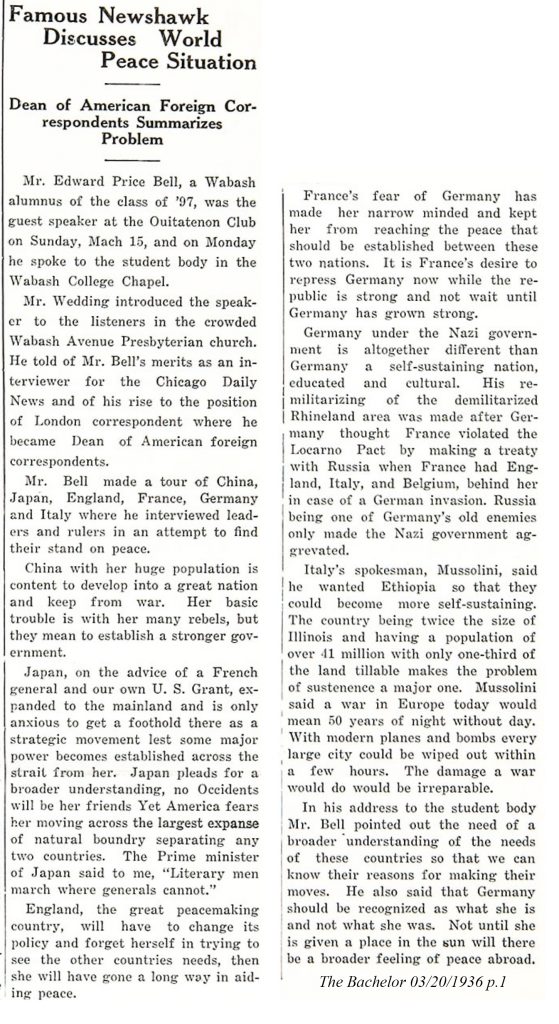“…as close to the perfect newsman as it is possible to be.”

Edward Price Bell was born in Parke County, Indiana on March 1, 1869. The farm was remote and life was simple, but the family moved to Terre Haute when he was young. At the age of 13 Bell walked into the offices of the Terre Haute Gazette’s newspaper offices and offered to become a correspondent. Wearing his best suit, and with a flower in his button hole, the boy evidently impressed the grizzled editor as Bell walked out as the riverboat/houseboat correspondent on the Wabash River.
For his education, Bell attended Hanover for one year, then transferred to Wabash. Our records show that Bell left early in his senior year, sailing to England in June of 1896. He had an assignment from the Chicago Daily News to study the lives of the poor in England and report back. He lived in a settlement house in the Whitechapel area of London for several months. An extremely poor area, it is perhaps best known as Jack the Ripper’s haunt. When his assignment was complete, he returned to Chicago. He very quickly made a name for himself as a dogged reporter. He covered race riots in North Carolina, a Chippewa uprising in Minnesota, the Klan in Indiana and corruption in Cook County.
In 1900 he returned to London where he lived and worked for 23 years, longer than any other foreign reporter. He made friends wherever he went and had a talent for getting an interview that was remarked upon by his fellow correspondents. He said he had a simple system. From his Indiana Journalism Hall of Fame citation, we can get a better picture of him,
“In his search for the facts and the reasons behind them, Bell went after and obtained interviews with men at levels of government that had never been approached by journalists before.
“His method was to convince the lesser figures around his proposed subject of the beneficial nature of his projected interview, until, when he finally approached the man himself, the latter found himself penned in on every side by subordinates urging him to grant the interview and was finally forced to give in.”
After his first assignment in England, he returned home and married Mary Alice Mills of Crawfordsville. It seems they must have met while he was a student here. They had two sons and a daughter.
His talents and his passion led him to advocate for peace, having covered WWI from England. Along these lines, he organized a meeting/conference with the Prime Ministers of Great Britain and Canada and President Herbert Hoover. This conference of 1929 went a long way to the London Five Power Naval Conference of 1930 which imposed limitations on naval armaments.
Bell traveled widely and used his gifts to obtain in-depth interviews with world leaders in an effort to avoid another catastrophic great war. This clipping from The Bachelor of March 20, 1936 provides a clearer picture of his work on behalf of world peace.

Bell was, at one time, the highest paid journalist in America. A sign of the respect he engendered among those who met him. He is credited with creating the long form interview that is a standard today. In 1930 he was nominated for a Nobel Peace Prize for his work. He did not win, but always treasured the letters in support of his nomination.
There is so much more to share about this high achiever, his worldwide travels, and chats with world leaders. Edwin Price Bell loved to share the stories he heard and clearly loved to travel. He died in 1943 at the age of 74. His Indiana Hall of Fame citation says that the cause was beriberi which he picked up on his travels to China. He received an honorary degree from Wabash and from Northwestern University. He lived a long and productive life and Wabash is glad to have him as one of our Loyal Sons!
All best,
Beth Swift
Archivist
Wabash College